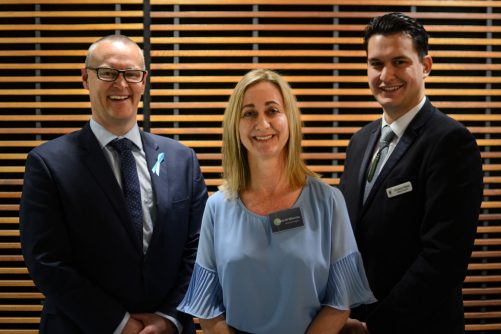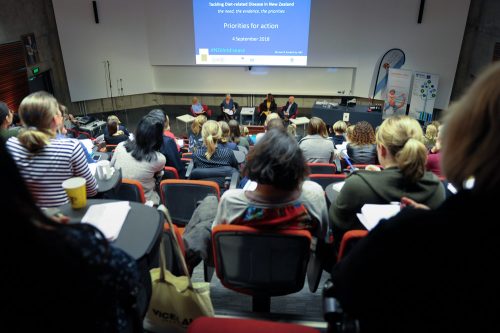Symposium: Tackling Diet-related Disease in New Zealand
4 September 2018
Researchers call on Government to take lead in tackling diet-related disease
Leading New Zealand nutrition experts gathered at a recent symposium about tackling diet-related disease in New Zealand. Opened by Minister of Health, the Hon David Clark, the symposium featured global perspectives, and also uniquely New Zealand views from Māori, research and industry.

Several Healthier Lives researchers were among those who gave presentations about the latest research findings on topics such as the healthiness of New Zealand foods, the role of food labelling, children’s exposure to junk food marketing, and the price of food. Lively discussions and debate throughout the day generated a growing sense of momentum for introducing a range of measures to tackle diet-related disease.
Summary of the day
Following presentations, Healthier Lives Director Professor Jim Mann noted that widespread acceptance of the role of diet as a major determinant of human health is a huge leap forward. He summarised the following key messages emerging from the symposium:
- Effective monitoring and evaluation is enormously important and a new national nutrition survey is urgently needed so that we can questions such as ‘how much sodium are New Zealanders eating?’;
- Implementing a healthy food policy in all schools is a particularly important first step in tackling growing levels of childhood obesity;
- Reformulating packaged and fast foods, to reduce their energy, salt and sugar contents, will reduce harm and will be most effective if government-led;
- Improving food packaging, labelling, marketing and advertising, particularly the way foods are marketed to children, is absolutely key to tackling diet-related disease. In the past, food industry ‘pledges’ have not worked, and this area requires strong government leadership;
- Thinking about the positives as much as the negatives is also important, for example we need to find ways to increase the supply of and access to healthy foods such as fruit and vegetables;
- Research shows that strategies like a tax on sugar sweetened beverages to reduce consumption of sugary drinks have worked in other countries, are cost-effective and could work well in New Zealand.
Strong leadership required to combat New Zealand’s high levels of obesity

Healthier Lives Deputy Director Professor Cliona Ni Mhurchu, one of the symposium organisers, said:
“New Zealand has the third highest levels of obesity in the OECD. Our inexorably rising levels of obesity and associated diseases mean we must rethink our approaches to the way we tackle these diseases.
“This symposium was an opportunity to present and discuss much of the latest evidence that is unique to New Zealand.”
“We need commitment and strong leadership from the Government and agencies on new approaches. Creation of a healthier population food supply requires commitment, strong leadership and legislation, such as a government-led reformulation programme to reduce salt, sugar and saturated fats in New Zealand packaged and processed foods. Evidence shows that industry-led change in the past has not worked,” she said.

Professor Mann said “despite encouraging recent trends, rates of diet-related disease remain high and are major contributors to inequity in health outcomes in New Zealand. There is convincing evidence that dietary changes can profoundly reduce risk but population-based initiatives will be required to facilitate their implementation.”
A discussion panel at the end of the symposium, adjudicated by broadcaster Kim Hill, gave a lively end to the day with a broad range of perspectives, including from industry (Simon Kenny, McDonalds), Māori (Megan Tunks, Toi Tangata) and research (Cliona Ni Mhurchu).
A panel of experts discuss the practical and social dilemmas associated with tackling diet-related disease in New Zealand Radio New Zealand (49m15s)
Tackling Diet-related Disease in New Zealand – the need, the evidence, the priorities
This symposium was a collaboration between the DIET Programme (NIHI, University of Auckland), INFORMAS (University of Auckland), and the BODE3 Programme (University of Otago, Wellington), which are all funded by the Health Research Council of New Zealand. Healthier Lives was a co-sponsor of the symposium.
More information about the symposium and details about the speakers and abstracts can be found on the event website.
Media coverage
A panel of experts discuss the practical and social dilemmas associated with tackling diet-related disease in New Zealand Radio New Zealand (49m15s)
Nutritional labels on food have little effect – research Radio New Zealand
Schools need national health food policy, researchers say New Zealand Herald
Study on growing serving sizes highlights obesity problem Radio New Zealand
Research menu for healthier population Waatea News
Do we need a national health food policy for schools? Radio New Zealand Lately with Karen Hay (approximately 14m4s-20m51s)
Fast food serving sizes increase by 5% in four years Radio New Zealand Checkpoint with John Campbell (2m38s)
Health researchers call for changes to food labelling Radio New Zealand morning report (2m59s)
Calls to regulate school lunches Newstalk ZB (3m45s)
Originally published 13 September 2018.


